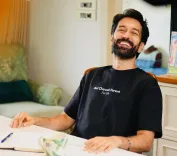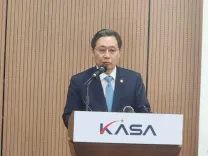Could Karan Tacker Be Right About AI Making Actors Redundant?

Synopsis
Key Takeaways
- Karan Tacker is concerned about the impact of AI on the acting profession.
- The entertainment industry is increasingly using artificial intelligence for practical effects.
- Cyber fraud is a growing threat, as illustrated by Karan's personal experience.
- Awareness and caution are essential in this era of technology.
- AI could lead to job displacement in various fields, including acting.
Mumbai, June 27 (NationPress) Renowned television star Karan Tacker, currently preparing for the launch of his new series “Special Ops 2”, recognizes the capabilities of artificial intelligence yet voices apprehensions regarding its implications, including the potential job loss for actors and the rise of cyber fraud.
When asked if he views AI as a beneficial ally or a perilous foe, Karan shared with IANS: “The show (Special Ops 2) mainly revolves around cyber warfare. Naturally, artificial intelligence plays a role, but the focus is on the broader theme of cyber conflict…”
“Regarding AI, I definitely believe it has integrated into our daily existence. For instance, in our films, we employ VFX. The explosions you witness are not genuine; they are created using AI technology on a computer.”
The actor mentioned that his initial two promotional campaigns for his brand were produced by AI.
“AI is indeed a significant aid,” he remarked.
Nevertheless, Karan acknowledges that this is a challenging era.
“Indeed, it’s a very challenging time. Neeraj Panday showed me a 3-minute short film. After viewing it for a minute, he requested me to pause it. He asked for my thoughts, and I responded that it was a captivating concept.
“He revealed it was based on AI, and all the actors were not actual beings. It was all generated from computer prompts. I cannot say it appeared real; it was real. There may come a time when we, as actors, could become obsolete. Because now it's so straightforward to accomplish this.”
He certainly harbors fears about these developments.
“However, I believe it’s wise to contemplate these possibilities. It’s better to be cautious. Remaining alert is essential.”
Karan recounted an experience of receiving a scam call.
“Recently, I received a call stating that I had invested in a fund that had matured. They had detailed information regarding my investment. They suggested I email my taxation details, including GST, so they could transfer the funds.”
“It was, without a doubt, a fraudulent call and a phony email. Such occurrences are common. However, being sharp and vigilant is the only way to navigate through it. Additionally, you’ve had a successful career.”








